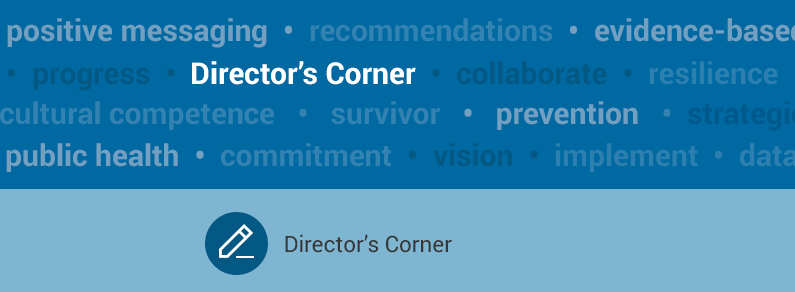NFL Demonstrates We All Have a Role to Play in Advancing Suicide Prevention
July 31, 2012

As a member of the Action Alliance for Suicide Prevention, I am honored to be a part of a pioneering effort to engage public and private sector resources and support to bolster a coordinated national response to suicide. Working to bring about enduring change in the way our communities and various sectors address this issue has shed light on some of the challenges we face. One such challenge—one that presents an enormous opportunity for advancing suicide prevention—is the awareness that few businesses recognize the enormous role they can play in preventing suicides in the community by raising awareness of suicide risk and encouraging a culture that makes it okay for employees to reach out for assistance. But this month, the National Football League launched an outreach campaign that represents a critical step forward in demonstrating the role employers can play in helping the Action Alliance reach its vision of a nation free from the tragedy of suicide.
In recent years, the NFL has augmented its network of support services for current and former players, taking a holistic approach to total player health and providing benefits and services to help players succeed in all aspects of life. Many of us watched as Junior Seau’s tragic suicide was reported on the news. In the wake of tragic suicide deaths of former players within the NFL community, however, the NFL recognized the need to do more. In an effort to develop a responsible approach to the issue, the NFL reached out to several members and partners of the Action Alliance for guidance. The result led to the launch of the NFL Life Line, a service tailored to meet the specific needs of the NFL “family”—including current and former players, coaches, team and league staff, and their family members.
The Life Line effort recognizes the many challenges that NFL players confront throughout different chapters of their lives. Separation from the game and the social supports of playing with a team, chronic health issues or serious injuries, aging, trouble finding employment, dealing with family or relationship problems, and financial issues can all cause stress and depression among players and their families. At the same time, the NFL community has important and valuable strengths: the players’ strong bonds, not unlike a brotherhood, forged over years of teamwork; a strong network of engaged families; a culture of dedication, shared responsibility, and respect; and a sense of resilience built on driving themselves to perform at their peak, even in adversity.
Working with a small group of dedicated partners, the NFL has integrated crisis support, suicide prevention and mental health as critical components of their recently launched NFL Total Wellness initiative. The NFL partnered with Link2Health Solutions (which runs the National Suicide Prevention Lifeline), The Jed Foundation, Education Development Center, and communications and marketing firm Reingold to create the NFL Life Line, a free, confidential, 24/7 hotline that connects all members of the NFL family–active and retired players, coaches, team and league staff, and their family members–with a specially trained, professional crisis counselor. The Substance Abuse and Mental Health Services Administration, the National Institute of Mental Health, the Action Alliance, and the U.S. Department of Veterans Affairs also lent their voices and experience to this process.
The professional counselors who answer the NFL Life Line phones are part of an independent network of crisis centers; the NFL Life Line is operated by Link2Health Solutions in partnership with Centerstone and the Mental Health Association of New York City. In the coming months, an online crisis chat service will be established, alongside a self-check quiz adapted for the NFL family by the American Foundation for Suicide Prevention. Counselors are not affiliated with the NFL in any way, and confidential information about individual callers or calls is not shared with the NFL, its teams, or any other organization.
To raise awareness of the service and appeal to those who can benefit from it, the NFL has developed an outreach campaign and website to promote this resource in a way that empowers audiences and encourages help-seeking behaviors. On the website, videos feature former NFL players speaking directly to their fellow players as only they can, acknowledging that life can be tough and affirming the value of reaching out for support. The messages are personal and direct, and as the NFL spreads the word among members of its community, it will continue to explore similar outreach channels that foster peer support around this issue.
With a largely male membership that represents a higher-risk age bracket and is subject to unusual stresses and life transitions, the NFL’s actions signal a positive shift in how communities, organizations, and employers can start identifying at-risk individuals and tailoring services to meet their needs. I applaud the NFL’s leadership and willingness to take responsibility for supporting members of the NFL family, as well as its decision to work with national leaders in suicide prevention efforts to address this issue in a collaborative and responsible way. We know that there is much work to be done to reduce the burden of suicide and suicidal behaviors in this country, but I am inspired to see such a public and far-reaching organization as the NFL emerge as a workplace leader in advancing a healthier population. Through their deeds and words they have shown that we all have a role to play in suicide prevention.
You can learn more about the new NFL Life Line here.
Best,
Jerry Reed, Ph.D., MSW
Director, SPRC
